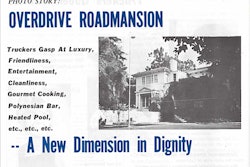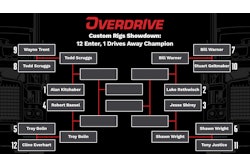Should company drivers be compensated directly for time spent in the sleeper berth?
Readers were in some ways as divided as the executive and judicial branches of government over whether time spent off-duty in the sleeper berth of a truck should be time company drivers should be directly compensated for. As is shown in poll results above (reflecting the choices of more than 800 respondents), more see pay as necessary than not, by 11 percentage points.
“If you are in your truck at any time, you should be paid,” wrote Jason McCarter, commenting under the poll here at OverdriveOnline.com. Even if off-duty for purposes of the logbook, he added, “You are responsible for the load and the equipment at all times. … We should be compensated for all hours!”
The poll was conducted in the wake of the Department of Labor’s opinion letter following a couple of court rulings from recent history that have placed judgments on large carriers that suggested minimum-wage compensation for drivers’ sleeper berth time was needed. The essence of the DOL’s argument, in response to a related question from a small fleet that spelled out a particular case, was that in that case drivers were, as wrote Overdrive‘s James Jaillet, “not owed minimum wage pay for the off-duty sleeper-berth time, as the driver was ‘not engaged to wait’ for work during that time.”

Driver Bob Stanton, commenting under the story in the Overdrive‘s Trucking Pro LinkedIn group, directly disagreed with the DOL opinion: “OTR drivers are not free to pursue activities of their own choosing while off-duty,” he wrote. “We are engaged to wait.”
The DOL opinion had likened the situation to that of a construction worker in on- or near-site housing away from home. Other drivers like Dan Stodd, commenting under the poll, pushed back at such characterizations. “If you’re responsible for the truck/trailer/cargo and not allowed to leave,” he said, “then yes you must be compensated for your time.”
Not all commenters agreed. James Rowland said so much driver support of direct compensation for truly off-duty sleeper time might be tantamount to “fighting over-regulation and then asking the government to make more regulations, just so you don’t personally have to hold your chosen carrier to a higher standard. … I can’t help but wonder why it is so many drivers seem to want more screwed-up government control in what’s suppose to be a private business?”
More from Rowland, and other voices, via OverdriveOnline.com:
Richard Lacroix: If companies expect you to stay with your truck and trailer, then yes you should get some kind of pay, either an hourly wage or a daily flat rate. When I worked for CN rail here in Canada cooking for the men that worked on the tracks, we were paid for 12 hours a day, guaranteed, but only had to work 8 hours. When you are forced to be away from home for your job, then you should be paid some sort of pay.
Kerry: The driver is responsible for the equipment, whether it is loaded or not. If you aren’t at home, your time is valuable and should be treated as such. Companies think that the driver is responsible simply because “it’s your job.” The poor compensation and lack of respect are going to be the nail in the coffin for the trucking industry.
Philip Dyar: The government has no problem regulating hours of service, speed limiters, health issues and everything under the sun. Let one of the [large carriers] start whinnying about not being able to compete, and they change the rules. [Those carriers are] the ones that want the trucks cut back to 65. That takes money out of my family’s mouth. And when you try to turn in a slip for waiting to load or unload, they say something like, ‘Well, this shipper doesn’t pay for detention.’ Or my favorite: ‘You didn’t have them sign it,’ and nobody is going to sign the thing because they have been told not to. So now is the time for them to do the right thing and bring our wages up to where it’s worth our while to do this job. I have been in trucking my whole life. My father was a driver and his father was a driver. I love what I do and I will give my heart for it, but if you want safety, well then pay for it. The drivers shouldn’t bear all the burden. Let’s share the changes. And yes we should get payed for staying out on the road. The company I work for gives us 20.00 a night for staying in the truck. Hell I fell lucky to get that, and I thank them for it, and we don’t have a big turnover and a bunch of wrecks. That $100 a week makes me. I am not greedy. I’ll settle for that.
James Rowland: I can’t help but wonder why it is so many drivers seem to want more screwed-up government control in what’s suppose to be a private business? Have they not proven to us by now that every single thing they touch always seems to be an absolute nightmare? It’s so so simple, everyone. If you want to be paid hourly, then gain yourself a few more qualifications on your license, work harder on your safety record, and make yourself worthy of one of those great salary paid jobs you want! Don’t be afraid to go earn that spot at a top-tier carrier. Or even better yet, manage your finances properly and create your own business! Guys and gals, this is one of the absolute last industries where a person with the willpower and determination can start out as a company driver over the road in a horrible “starter” company and within 5-10 years own not just one truck but a fleet of trucks… This applies to both this topic and the recent discussions over mandatory detention pay. I’m sorry, but until all you company drivers who can’t seem to negotiate for yourselves start buying your own equipment and getting your own customers, you and the government both have no business trying to tell the owners of private businesses and their customers what should be paid and at what rate. …













